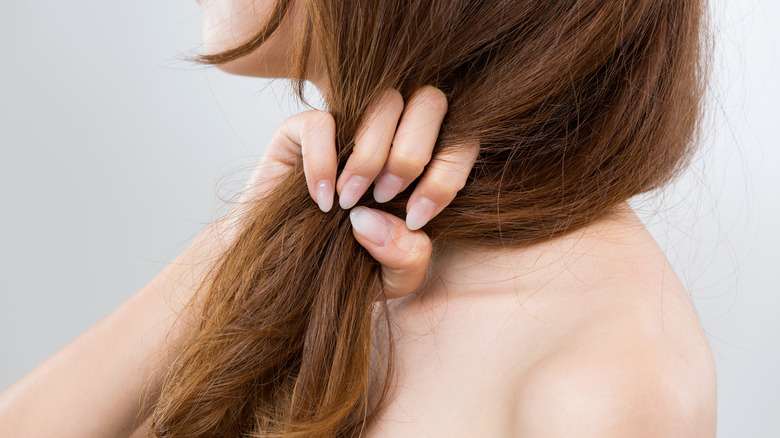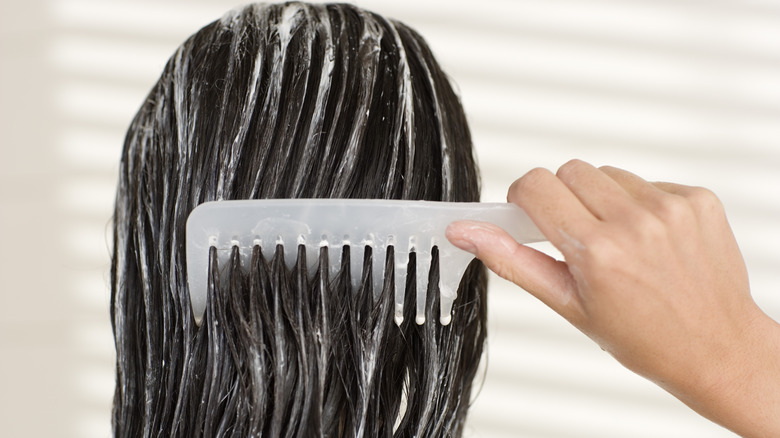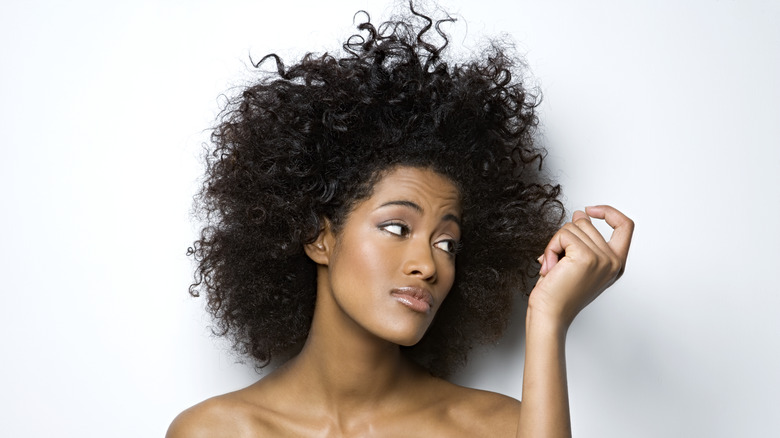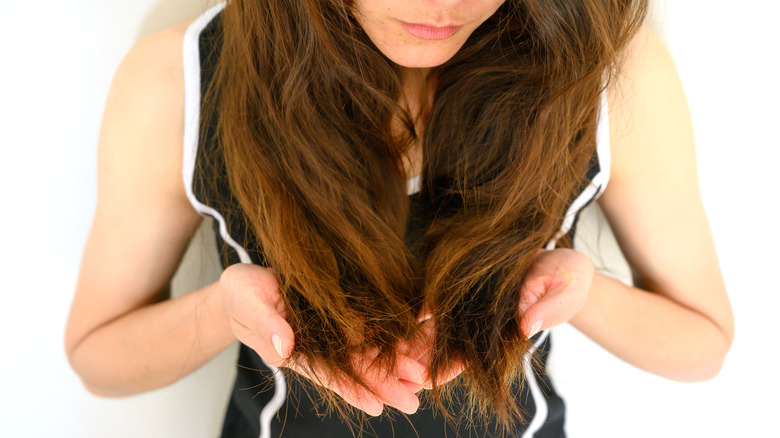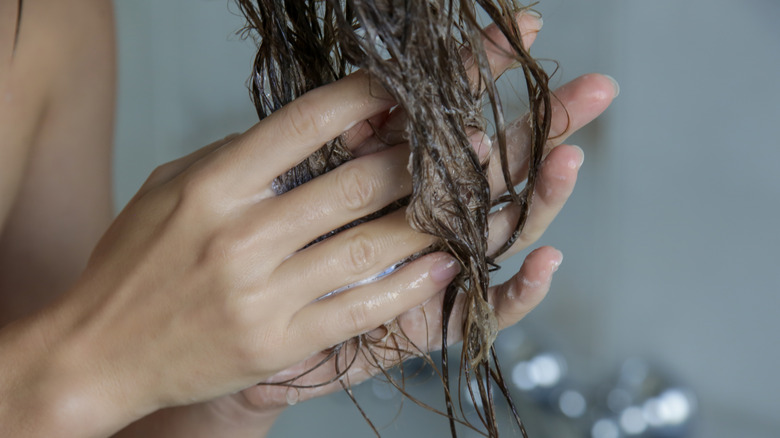How To Know When It's Time To Deep Condition Your Hair
One of the most important ways of keeping hair lustrous and vibrant is making sure it stays moisturized and nourished. In today's world, that's just not as easy as you may think.
Our hair is subjected to harsh weather conditions including very cold temperatures, snow, rain, and dry air. Yet being in the sun can also damage your locks. "Sun damage can come in the form of discoloration, dry and brittle strands, broken or split ends, thinning, and frizziness," dermatologist Dr. Wilma Bergfeld tells Cleveland Clinic.
Besides weather, our hair picks up environmental irritants. Consider how much your hair is exposed to on the subway, at concerts, or simply walking down the street. When we go about our day, hair takes in all the air pollution, allergens, pollen, and smoke that we walk through. To revitalize your hair, a regular washing and conditioning routine is vital. You'll also want to add deep conditioning to your repertoire, but only when it's needed.
Deep conditioners are different from regular rinse-out conditioners
Most people use a regular conditioner as the last step in the regular shampooing routine, and while that is a necessary component when you wash your hair, a deep conditioner is very different. Whereas a regular conditioner helps soften locks and makes them shiny and smooth, a deep conditioner restores hair strands (via Briogeo).
Regular conditioners target the hair's surface, while deep conditioners seep into the core of the strands, and in turn, mends and rejuvenates them. Regular conditioner and deep conditioner have different formulations, so while you can leave your regular conditioner on your hair for long periods, it won't work in the same way that a deep conditioner will.
Deep conditioners contain oils that penetrate the hair strands. These include avocado oil, almond oil, rosehip oil, aloe vera, argan oil, coconut oil, and sunflower seed oil. If you don't know whether you need a deep conditioner, there are a few signs to look for.
Dull locks mean strands are losing their luster
Healthy hair looks shiny and has a distinct sparkle to it, so if you notice your hair has been losing its shine or looking dull, it may be time to use a deep conditioner.
Dull hair can be a result of not getting enough nutrients, but it can also occur as a result of using too many chemical treatments, such as hair dye, or using too much heat on delicate strands by using curling irons, blow dryers, and straighteners too often.
When hair starts to look dull, it means that changes are already taking place which are causing it to lose its moisture and sheen. Hair that is very thick, curly, or wavy may not hold onto natural oils as much as fine and straight hair, therefore it can be more prone to looking dull. Deep conditioning is important for those with curls and thick locks. If not properly moisturized, the damage may become permanent.
Dry hair is a sign you need a deep conditioner
Once hair starts to lose its luster, it can quickly progress to becoming dry. Natural oils start in the scalp, so the first signs of dry hair may be that the ends are dry and flyaways keep cropping up, but once it advances, you may also notice that your scalp may be dry and flaky. Hair may be devoid of any shine whatsoever, and frizzy. You may also notice that when you touch the ends instead of feeling soft and nourished, they feel harsh and even abrasive to the touch.
Dry hair is caused by all the same environmental agents that cause dull hair, such as chemical treatments and too much heat, but it can also occur as you age or even from certain health conditions, as per WebMD. These include anemia, eating disorders like anorexia and bulimia, as well as thyroid conditions such as hypoparathyroidism and hypothyroidism. When hair is dry and isn't remedied with a deep conditioner, it can progress to become damaged.
When your hair is brittle, it needs a repair
Hair that is brittle likely needed a deep conditioner long ago. Since brittle hair is already damaged, it has a high tendency to break off. It is already in a weakened state and you may experience split ends. Without treatment, you may start to notice hair loss.
Brittle hair and dry hair often show the same signs of lacking luster and shine. However, one not often known sign that you have brittle hair is that when you curl or straighten your hair, it simply doesn't respond to the heat the way it used to. This results in the curl not sticking or the section you just straightened not looking very straight.
It's also a sign that hair has lost its elasticity, so breakage is very common once dry hair has progressed to this stage. However, a deep conditioner can help repair hair, even now.
Don't deep condition too much
Though deep conditioning can restore dull and dry hair, if you do it too frequently, it can actually cause other problems. If your hair isn't that damaged to begin with, using a deep conditioner too often can cause hair to become over-conditioned. Signs of over-conditioning include hair looking and feeling flat and devoid of bounce. It may appear to look greasy, oily, and weighed down.
In most cases, using a deep conditioner once a week is the goal. However, if your hair is extremely dry, you can use a deep conditioner two or three times a week until you see results.
If you're unsure about how dry your hair actually is and whether you should deep condition it once a week or more than that, consult your hairstylist. They will be able to give you an in-depth look into your specific hair texture and its current state.
